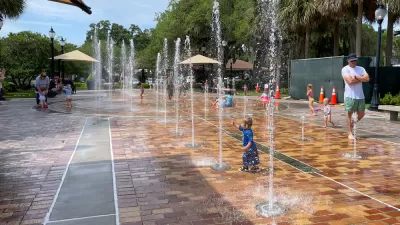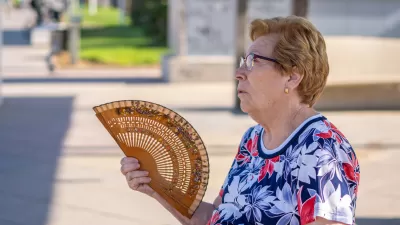As extreme heat threatens infrastructure and public health, municipal ‘heat officers’ work to develop cooling strategies to keep urban residents safe from increasingly hot temperatures.

“About a fifth of the most populated cities in the world could warm by more than 4°C by 2050,” writes Michaela Haas in Next City. In the United States, an estimated 12,000 people die each year from heat-related causes. Haas profiles two of the nation’s first ‘heat officers,’ Marta Segura in Los Angeles and Jane Gilbert in Miami-Dade County, who are tasked with developing strategies for cooling their cities and reducing the impact of extreme heat.
To address the urgency of the threat quickly, Segura is working on some ‘low-hanging fruit’ policies that can make an immediate difference, such as “a campaign to educate Angelenos about the risks and first signs of heat-related illnesses; air conditioning units for underserved communities; and a ‘cooling network’ of shops, department stores and fast-food chains at which people can come in and cool down, ‘so that everybody who starts feeling overheated on their way to the bus stop knows: I can get a glass of cool water here and sit down in a cooled space to recover at no cost.’”
In Miami, Gilbert plans to increase tree canopy in the city’s most vulnerable areas and supporting homeowners and renters in retrofitting their homes and purchasing efficient cooling systems. Miami and Los Angeles have also banded together with 23 other cities in the “cool roadways partnership” to negotiate lower prices for cooling roadway materials.
To help cities mitigate the impacts of heat, the C40 Cool Cities Network has created an ‘urban cooling toolbox’ that addresses “Green infrastructure (such as trees, green roofs, permeable pavements), blue infrastructure (drinking fountains, public swimming pools and other forms of water cooling), gray infrastructure (cool roofs, cool pavements, passive cooling in buildings), communication (outreach, cooling centers and campaigns), policy (climate design guidelines, heat emergency response plans, cooling tax rebate programs) and urban development (urban geometry, building materials).”
FULL STORY: How America’s First ‘Heat Officers’ Are Cooling Miami and Los Angeles

Maui's Vacation Rental Debate Turns Ugly
Verbal attacks, misinformation campaigns and fistfights plague a high-stakes debate to convert thousands of vacation rentals into long-term housing.

Planetizen Federal Action Tracker
A weekly monitor of how Trump’s orders and actions are impacting planners and planning in America.

Chicago’s Ghost Rails
Just beneath the surface of the modern city lie the remnants of its expansive early 20th-century streetcar system.

Bend, Oregon Zoning Reforms Prioritize Small-Scale Housing
The city altered its zoning code to allow multi-family housing and eliminated parking mandates citywide.

Amtrak Cutting Jobs, Funding to High-Speed Rail
The agency plans to cut 10 percent of its workforce and has confirmed it will not fund new high-speed rail projects.

LA Denies Basic Services to Unhoused Residents
The city has repeatedly failed to respond to requests for trash pickup at encampment sites, and eliminated a program that provided mobile showers and toilets.
Urban Design for Planners 1: Software Tools
This six-course series explores essential urban design concepts using open source software and equips planners with the tools they need to participate fully in the urban design process.
Planning for Universal Design
Learn the tools for implementing Universal Design in planning regulations.
planning NEXT
Appalachian Highlands Housing Partners
Mpact (founded as Rail~Volution)
City of Camden Redevelopment Agency
City of Astoria
City of Portland
City of Laramie





























